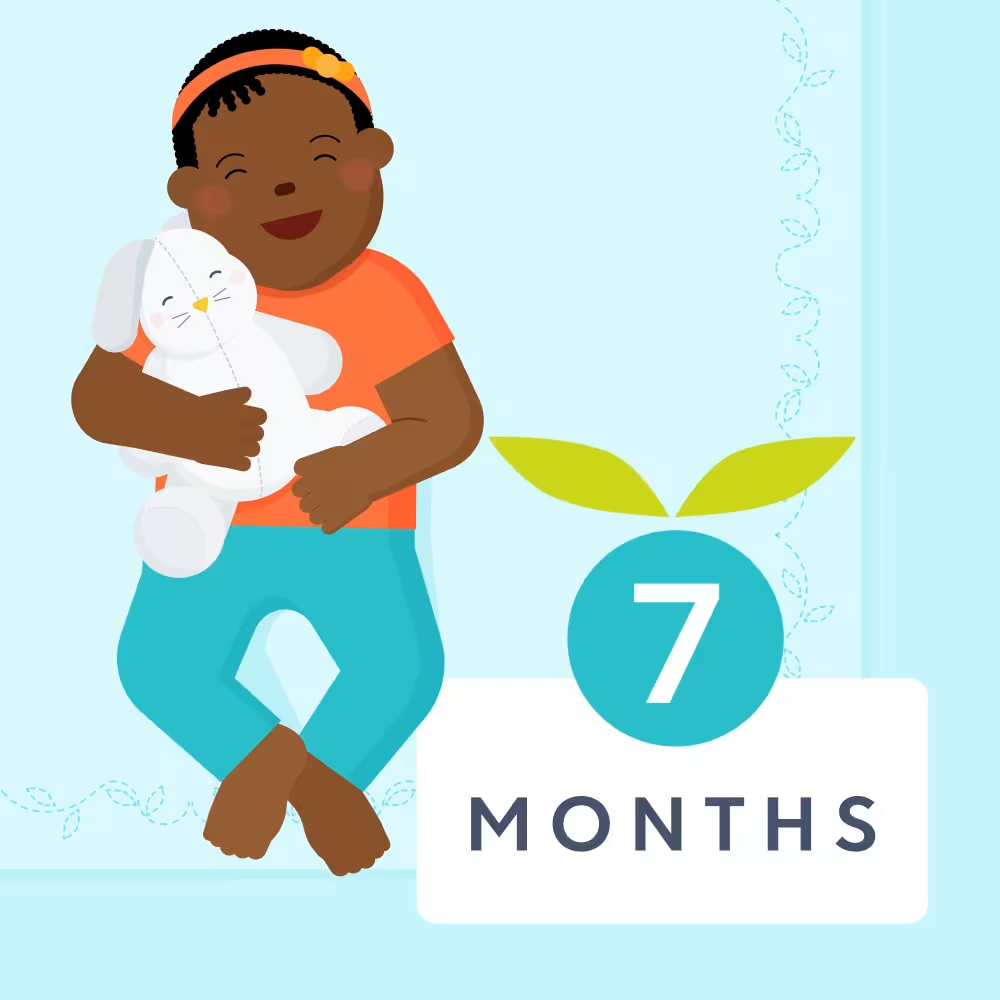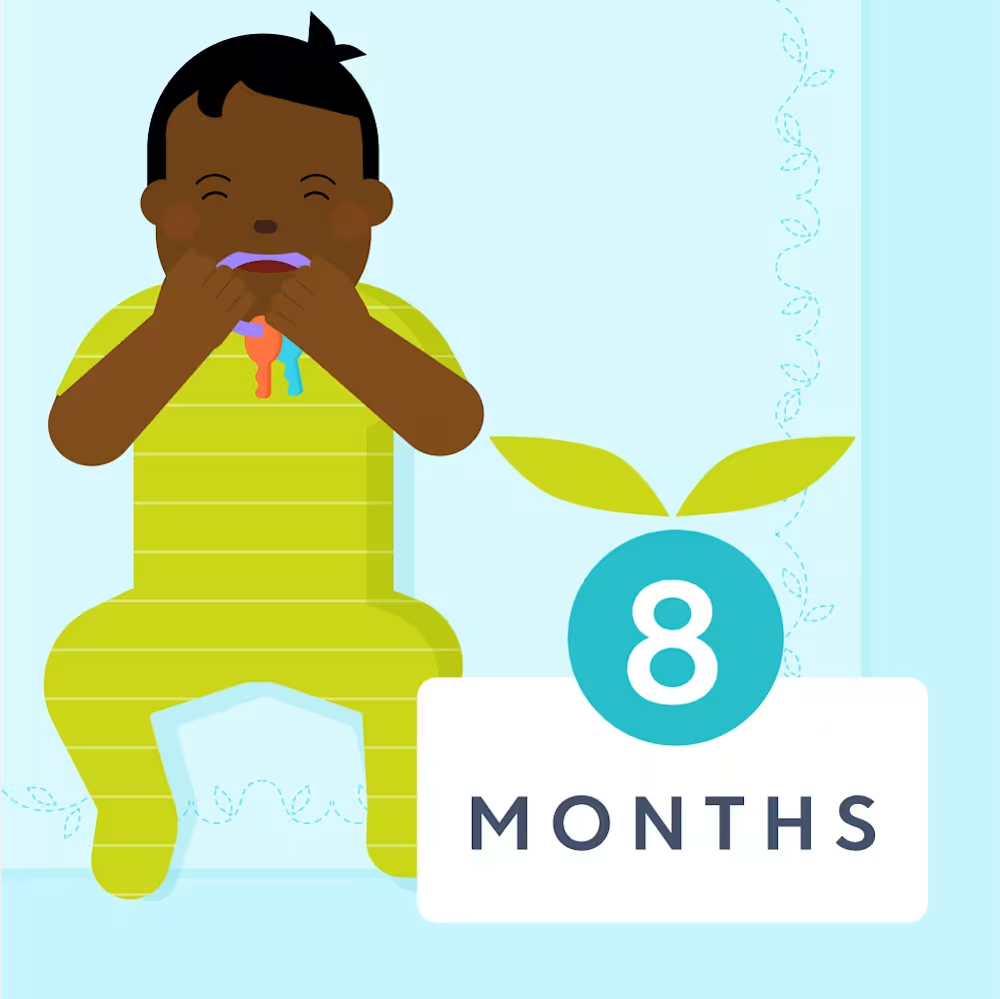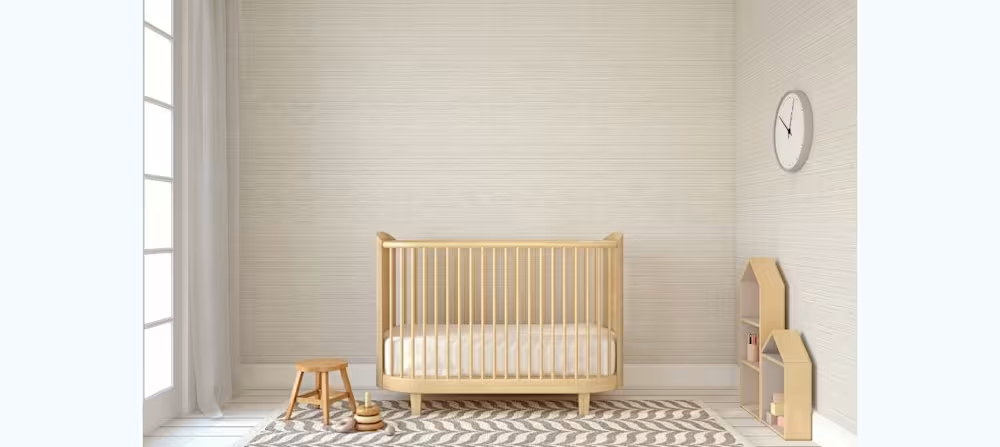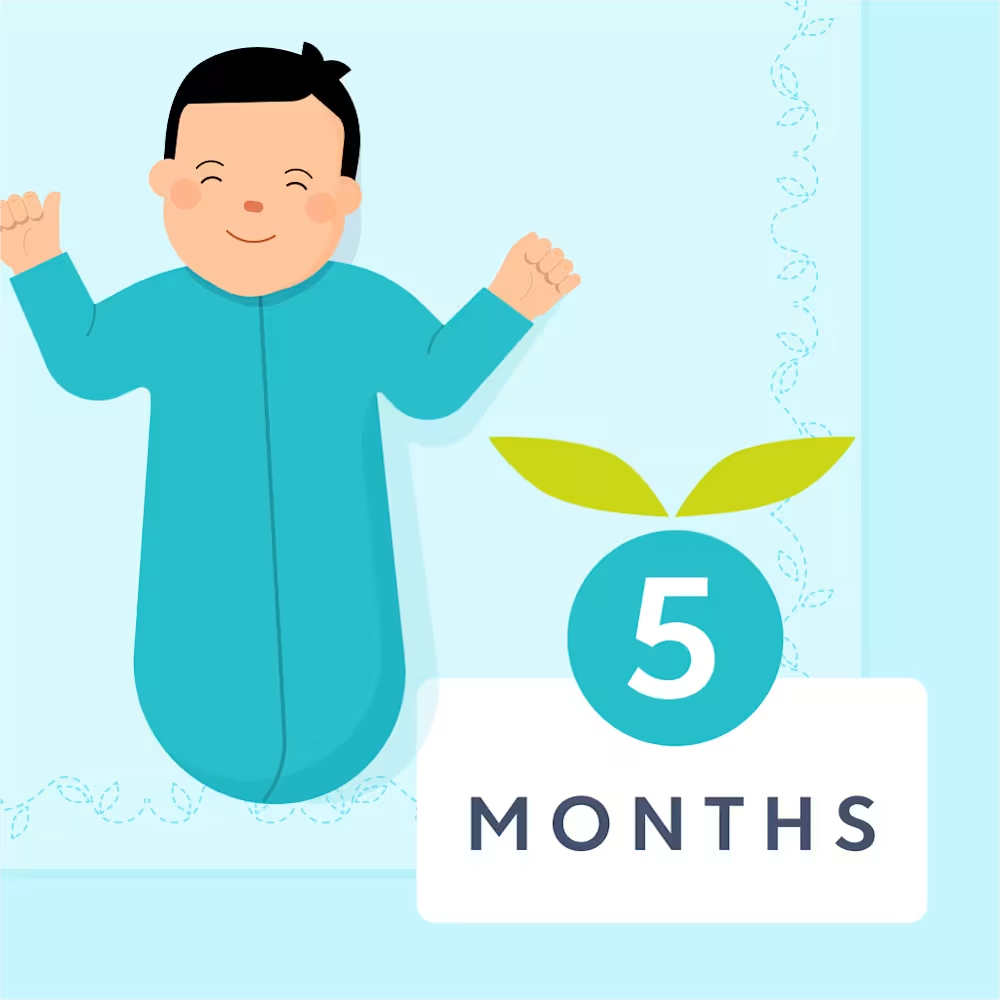6 month old sleep schedule: Bedtime and nap schedule
Updated Feb 02, 2026
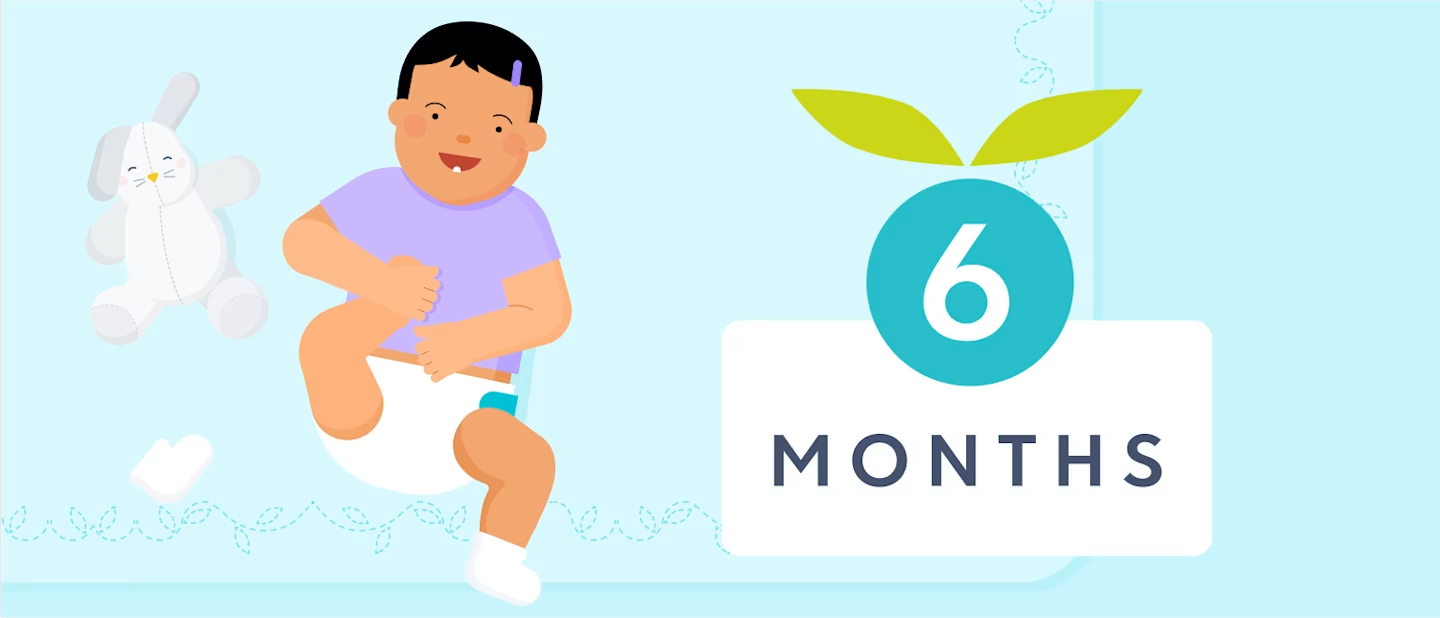
Once your baby turns 6 months old, they’re likely to settle into a fairly reliable schedule with 3 regular naps. This often makes it easier to prioritize some naps at home while planning activities in between! In this article, we’ll equip you with a sample 6 month old sleep schedule and ways to combat any upcoming nap resistance.
How much should a 6 month old sleep?
We recommend aiming for around 14 hours of total sleep daily at 6 months old. This usually looks like 11 - 12 hours at night and 2.5 - 3.5 hours during the day.
Keep in mind, however, that babies’ sleep needs can differ, and there is a range of what is considered normal and healthy. The recommended hours should be viewed as a general guide. It's equally important to assess your child's mood and energy levels to ensure they are getting sufficient rest.
Most babies still need 2 - 3 hours of awake time between sleep periods at 6 months. Since that last nap can be tricky, we often encourage parents to help their child fall asleep any way they can for the third nap of the day, as long as it’s safe. This can help your baby make it to bedtime without getting overtired.
Here's a quick overview of what you may expect when it comes to 6 month olds and sleep. Note that these figures are averages and should be used as guidelines.
Top sleep tip for 6 month old
Your 6 month old baby probably still needs 3 naps. If that last nap is hard to get in, consider lengthening the awake window beforehand by 15 minutes. It’s OK if bedtime ends up being later due to the later nap.
Sample 6 month old sleep schedule

Note: Sleep needs vary by child and this chart should be viewed as an example only.
Morning rise: 6:30 AM
Wake window before first nap: 2 hours
First nap: 8:30 AM - 9:45 AM (1.25 hour nap)
Wake window before second nap: 2.25 hours
Second nap: 12:00 PM - 1:30 PM (1.5 hour nap)
Wake window before third nap: 2.5 hours
Third nap: 4:00 PM - 4:30 PM (30 minute nap)
Get ready for bed: 6:30 PM
Wake window before bedtime: 2.75 hours
Asleep: 7:15 PM
Naptime schedule for a 6 month old
Expect your 6 month old baby to take around. However, it’s common for babies with short naps to continue to take 4 naps per day at this age, but that typically reinforces the short naps and short nights. Sometimes we need to lengthen the awake time to lengthen the naps and transition to 3 naps per day.
In general, 6 month olds need 2 - 3 hours of awake time between sleep periods. Wake windows typically increase as the day progresses, so the longest awake period is often before bedtime. Your baby may need 2 hours of awake time before their first nap and up to 3 hours before their last one.
Many babies resist the third and final nap of the day around this age. While this may feel like a” resisting naps is a normal phase due to needing longer wake windows. However, don’t let this resistance fool you into thinking it’s time to transition to 2 naps. Most babies aren’t ready to until 7 - 9 months old. When a baby transitions too early, it can lead to new sleep challenges (hello, increased night waking!). Aim for longer wake windows to ensure your baby is tired enough to sleep instead of rushing to drop a nap.
How long should a 6 month old nap?
Ideally, the first 2 naps of the day will each be 60 - 90 minutes long. The third nap is typically shorter, around 30 - 45 minutes.
How many naps for a 6 month old?
Target 3 naps a day at this age. While it’s not uncommon to see 6 month olds still taking 4 naps, keeping this schedule too long can reinforce shorter naps and shortened night sleep. If this scenario sounds familiar, try to lengthen the awake time between naps and aim for 3 naps a day. Although it might sound counterintuitive, sometimes we need to lengthen wake windows to lengthen naps. Doing so allows sufficient sleep pressure to build, resulting in longer sleep durations [].
Here’s what a typical day may look like at this age:
3-nap schedule
Bedtime for a 6 month old
Sleep schedules tend to become more predictable at this age. Bedtime is typically 12 - 13 hours after your baby wakes up each morning. However, it’s important to be flexible and adjust bedtime earlier if needed, like when babies have short naps or skip a nap. This helps limit overtiredness, which can make it harder for babies to fall asleep and stay asleep. Likewise, if that third nap falls later in the day, bedtime may need to be pushed back.
What time should a 6 month old go to bed?
Many 6 month olds are ready for bed between 7:00 PM and 8:00 PM. However, the “best” bedtime for your baby will be determined by their circadian rhythm (internal clock) and how well they’ve napped that day. Circadian rhythm is set in large part by light exposure, meaning that your baby’s morning rise time will have a big impact on bedtime [].
As babies approach 7 months of age, they may occasionally skip (or resist) the third nap of the day. This is especially true for babies who nap well earlier in the day. Moving bedtime earlier on 2-nap days can minimize the impact of overtiredness on night sleep.
Why does my 6 month old keep waking up at night crying?
Your 6 month old may be waking up for various reasons — like , illness, or working on developmental milestones. However, a common cause of night waking at this age is . If babies rely on parental help to fall asleep at the beginning of the night and then wake between sleep cycles overnight, they often cry out. They want to be rocked or patted or fed again to go back to sleep!
Is there a sleep regression at 6 months old?
Contrary to popular belief, there isn’t a predestined “.” Sleep regressions can happen at any time. However, 6 months is a common age where babies may experience sleep challenges due to sleep onset associations and the need for a schedule adjustment. If your baby is suddenly sleeping poorly (fighting sleep, taking shorter naps, waking frequently overnight), we would call this a sleep regression.
Can my 6 month old sleep with a pacifier?
Babies can sleep with a pacifier at 6 months. While a useful soothing tool, a paci may also contribute to bumpy sleep — especially if it falls out of their mouth during sleep and they cry out for a caregiver to replace it. Like anything, there are pros and cons.
The AAP advises not to force a baby to take a pacifier or use it to delay (or replace) feedings [].
Can I sleep train a 6 month old?
Yes, most babies are developmentally ready for . There are a variety of , from gradual methods that take longer to more intense paths that often produce faster results. It’s ultimately up to you to decide if sleep training is right for your family.
Can a 6 month old sleep on their stomach or side?
At 6 months, if your baby can roll both ways (front to back and back to front) it’s generally acceptable for them to sleep on their stomach or side, as long as they moved into that position on their own. The AAP recommends that you continue to place your baby on their back in their sleep space until 12 months []. Once they’re rolling, you don’t have to return them to their back if they move during sleep.
Should I swaddle my 6 month old?
We suggest phasing out swaddling as soon as your baby shows signs of rolling (which is usually the case by 6 months) or begins practicing independent sleep skills. Beyond safety concerns, swaddling can get in the way of teaching your little one how to fall asleep on their own — one of the most effective ways to prevent future sleep challenges.
If you’re looking to transition away from swaddling, like transitional swaddles and sleep sacks still provide comfort but don’t restrict a child’s arms, making them safe for sleep.
What are the developmental milestones for a 6 month old?
, your baby is likely rolling over and starting to interact with people and toys in new ways. Exciting! Here’s a list of what your baby may try at this age:
Roll over both ways (back to tummy and tummy to back)
Sit up with little support
Support weight on both legs while being held in a standing position
Explore solid foods
Transfer objects from one hand to the other
Shake, reach, and rake toys with their hands
Babble sounds like "bababa," "dadada," and "mamama”
Copy some gestures
Blow raspberries
Laugh
Enjoy social games and interacting with people
Does a 6 month old need to eat during the night?
It’s common for babies at 6 months to wake up to eat . However, some babies may be able to sleep longer stretches at this age and may not require night feedings. Reach out to your child’s healthcare provider if you have specific questions about your baby’s nutritional needs.
Takeaway
We recommend aiming for around 14 hours of sleep over 24 hours for babies at 6 months. This often looks like 11 - 12 hours at night and 2.5 - 3.5 hours during the day.
Most babies are taking 3 naps at 6 months. If your baby is taking 4 naps, consider keeping them awake longer between naps to move to a 3-nap schedule. Babies aren’t usually ready for a 2-nap schedule until 7 - 9 months.
At 6 months, little ones are typically ready for a bedtime around 7:00 - 8:00 PM. However, this will be dictated by their circadian rhythm and how well they napped that day. If their last nap of the day was on the later side, bedtime will be pushed later too. On the other hand, if your infant took short naps or skipped the third nap, consider moving bedtime earlier to limit overtiredness.
Babies are typically developmentally capable of sleeping through the night at 6 months, however, it’s also common to see 1 - 2 night feedings at this age.
If you're curious about what lies ahead, glimpse into the future to see what you might experience once your baby is on a and what you may expect from over their whole first year. Also look back at how far your little one has come by checking out a.
Share article:
Note: The content on this site is for informational purposes only and should not replace medical advice from your doctor, pediatrician, or medical professional. If you have questions or concerns, you should contact a medical professional.
5 Sources
Share article:

